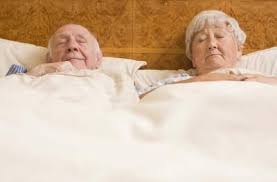 The older people with whom I speak often talk about the things they don’t do so well anymore, and the one that tends to top the list is sleep. While it is not just older adults who have trouble either getting to sleep or staying asleep, it can be a chronic issue. And one for which some of the medicinal therapies available may just not be good options.
The older people with whom I speak often talk about the things they don’t do so well anymore, and the one that tends to top the list is sleep. While it is not just older adults who have trouble either getting to sleep or staying asleep, it can be a chronic issue. And one for which some of the medicinal therapies available may just not be good options.
Why not a prescription sleep aid or perhaps one of the over the counter options like Benadryl – also known as diphenhydramine? Well, older adults tend to already have a number of prescription medications they take for any number of issues like elevated blood pressure or COPD or even neurologic conditions that just may not interact well with sedative drugs. The older metabolism does not process an added medication as easily as a younger metabolism, and a medication may simply be more potent to an older adult than a younger one because their bodies just have less fluid by volume for processing another medication.
The American College of Physicians has a number of recommendations for getting their targeted seven to eight hours of sleep a night, and these can be guidelines for us all. They suggest:
• The first seems to be a no-brainer, but they recommend you keep light and noise to a minimum and have a comfortable bed and pillow;
• Keep the bedroom quiet and relaxing; watch television in another room, and in fact do your reading or have your conversations in another room as well;
• Avoid having a clock where you can easily see the time, because it will just distract you from letting drift off;
• If you do not fall asleep in about 25 minutes, just get up and go to another room; if you wake in the middle of the night, reflect back on relaxing thoughts like long walks;
• Be active during the day, especially outdoor activity, but do not schedule your activity within two to three hours of bed time;
• Limit caffeine to earlier in the day, and do not consume alcohol close to bedtime (it may make you drowsy, but it also will wake you when its effect wears off);
• If you smoke, quit…the nicotine is a sleep inhibitor – never mind that the smoking itself is just plain unhealthy; and
• Eat balanced meals, but again, not too close to bedtime.
The ACP has a complete booklet you can download from their site, and it includes a personal diary for any of you or your older loved ones who do have trouble sleeping. They recommend maintaining the diary for the recommended week and bringing it along to the next visit with the physician.
Charlotte Bishop is an Aging Life Care Advisor, Geriatric Care Manager and founder of Creative Care Management, certified professionals who are geriatric advocates, resources, counselors and friends to older adults and their families in metropolitan Chicago. She also is the co-author of How Do I Know You? A Caregiver’s Lifesaver for Dealing with Dementia.






